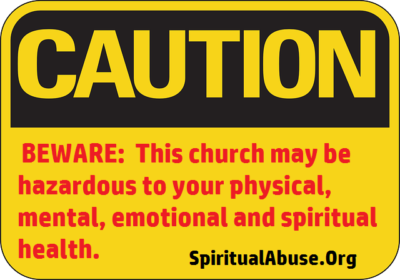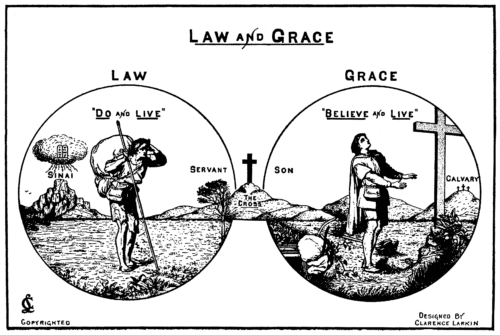In my career as a social worker, we have case studies that we use to examine a person’s life story in order to assess and evaluate how to best help the individual. When we are sharing with other professionals, we give the individual client a made up name in order to protect their privacy.
I have chosen this method to introduce to you some people I have known who have shared with me their stories of being raised in a spiritually abusive environment. Because of being raised in such a climate, many of these individuals still have parents or other family members who are in these groups, and therefore do not want to be identified in a public blog, due to the very difficult task of trying to maintain family relations with loved ones who are still in the group. I have honored their need for confidentiality.
Grace was born into the spiritually abusive environment she now believes to be a cult. Her father was a United Pentecostal Church ordained minister, and both grandfathers were also ordained in the same organization. Grace’s parents were evangelists, traveling around and preaching almost every night of the week for different churches in the United States. This was many years ago and Grace’s parents traveled by auto, staying in the homes of the pastors for which they preached.
During this time period, Grace was approximately two months old when her father decided one day that her screaming was “anger”, and that she was “throwing a tantrum.” He spanked her infant legs with his hand, a couple of swats to make it sting and begin teaching her early that “anger is a sin.” At her next doctor’s appointment, it was discovered that her mother, who’d been trying to breastfeed her, was not making enough milk, and the cries were cries of hunger and tummy discomfort. Grace is unclear about her parent’s feelings in this regard, simply stating that they recorded it in her baby book with a “ha, ha” beside the date of her “first spanking,” even after they knew about the hunger.
Grace says her parents did love her and did not intend to be cruel, but the toxic environment was one both of them had been raised in, and they were simply doing what they thought was right at the time, based on their intense devotion to the God they’d been taught to believe was a demanding God of judgement.
Grace describes how her parents bragged for many years to their saints and to her and her siblings that they knew how to “train a child” to “behave in the house of God,” because they had trained her at nine months of age to “sit on the front row” during song service, alone with no adult. “If you got up or turned around, one of us would come off the platform (her mom was playing an instrument and her dad was leading service) and spank you, then sit you back down. You learned quickly. We know even babies can be trained.” Grace says their reasoning for this was that they were “home missionaries” starting a church and did not have a trustworthy adult yet converted to help watch her during service.
Grace says that some of her earliest memories were related to church. She says she can strongly relate to a title of a pop song that recently became popular, called “Sit Still Look Pretty,” because that was what she was told to do often as a little girl. She remembers wearing ruffled dresses with itchy tulle slips under them, squirming because she was uncomfortable in those clothes as they irritated her skin, but she would often be reprimanded for moving or swatted on the leg if she could not sit still.
She remembers her grandmother being reprimanded from the pulpit by her father, during one of his sermons, because the grandmother was drawing pictures for her to keep her entertained during the long sermons that were completely beyond her ability to understand.
Grace remembers taking candy from a Sunday School room at about age five and then, when her mother found out, she told Grace that it was stealing, it was a sin, and she would be lost for taking candy like that. She was led in a prayer of repentance and sent to apologize to the Sunday School Teacher. She still remembers the heavy sense of guilt, though she really didn’t know it was stealing when she did it.
From age five, when her sense of sin was awakened by the “stealing” event, Grace describes how she would “seek the Holy Ghost” every service, going down to the altar and kneeling there as long as she could stand it to pray and ask for the experience of speaking in tongues. This went on every service for three years, until she finally received the experience at the age of eight. She remembers being baptized “in Jesus’ name” not long before that, and how “I really did feel very clean and light inside,” but wonders if it was the baptism itself or the belief in what it was doing (taking away her sins).
Grace recalls a time around nine years of age when “we were having a shouting service” and she and a friend around the same age fell out on the floor and rolled back and forth “because we had heard them preach about holy rollers being really spiritual”. Adults stopped them from continuing, but she remembers being confused about why they would lift up such a thing verbally, but yet stop the girls from actually doing it. She remembers a mixture of shame and confusion about the incident.
Out of 12 years of education, Grace says only two and a half years were in a public school. “Three years were our own church school, and the rest of the time I was home-schooled.” She says she did not learn some of the things that are normal for school aged young people to learn. “I never learned anything about Greek mythology, and even the philosophers were barely mentioned in the context of Paul’s visit there.” She relates that her education was very poor in mathematics, and that she distinctly remembers her father slapping her when she couldn’t figure out how to do a math problem. She remembers a lot of yelling at her as well, when it came to learning math.
Grace describes herself as a “very shy, timid teenager, easily brought to tears.” She says that, because of the environment, she was highly sensitive and full of shame and guilt that was largely misplaced.
“The church rules…you never questioned them”. She learned as a toddler that pants, cut hair, and makeup were sins for women and she would point out people she saw wearing these things and ask her mother “Is that lady Catholic?” She apparently equated sinfulness with the Catholic religion, as is so often done over UPC pulpits.
No jewelry of any kind was allowed, and strict rules governed the sleeve length and dress length of her clothing. “We stopped wearing short sleeves when I was about ten,” she remembers. No slits of any length were ever allowed in skirts, and sleeves were required to be below the elbow. Hems were below the knee “sitting, standing or kneeling.” She said her long uncut hair was at one time to her ankles, “but we were not allowed to wear our hair down if we were going to be on the platform. It was considered stringy and unkempt.” She remembers that, when going around family members who were not in the group, her parents would make sure she braided her hair or wore it in a bun so that “we will be a good testimony to the family.” Somehow, even though her hair was praised and glorified throughout her lifetime, Grace knew that it looked “like a hippy” when it was down and obviously untrimmed.
Grace calls herself a “girly-girl” because she always loved beautiful things, but says that she had to confine it to lace and flowers for most of her life because most pretty things were forbidden–such as jewelry, makeup, nail polish, etcetera.
Grace describes hearing many sermons about women staying in their place, but mostly from her father’s associates, not from him. She says this is probably likely to the fact that his mother was also a preacher when he was a child. However, submission was a topic that was preached in great doses, especially submission to one’s husband and primarily to the pastor.
Grace ends our interview by relating that she feels the most harmful part of being raised in this environment was the fact that the parents controlled the children to such a degree, and then her parents used the pastoral role to control her even further. “The pastor could tell you to do anything, even if the Bible didn’t say do it. You had to do it because the pastor said and if you didn’t you were going to hell, because the pastor was God’s man and you had to obey him as if he was God.” Grace says that, where parental boundaries fell short, her father was adept at “pulling the pastor card” in order to control her.
“I finally left his church when, as an adult in my thirties, I was told I had to have his permission to have people over to my house and he was in control of the guest list.” This was in his role as her pastor, not her father.
Grace’s story is only one of many that I hope to introduce you to over the next few posts. An entire life from babyhood into middle adulthood can hardly be summed up in this short article, but I have tried to include some of the most powerful stories that Grace shared about what it was like to grow up in this environment, virtually brainwashed by the isolation and involvement in such a group.
(To be continued)
Children Raised Under Spiritual Abuse
Children Raised Under Spiritual Abuse II
Children Raised Under Spiritual Abuse III
Children Raised Under Spiritual Abuse IV
Children Raised Under Spiritual Abuse V
********
Shop at our Amazon store! As an Amazon Influencer, this website earns from qualifying purchases.





